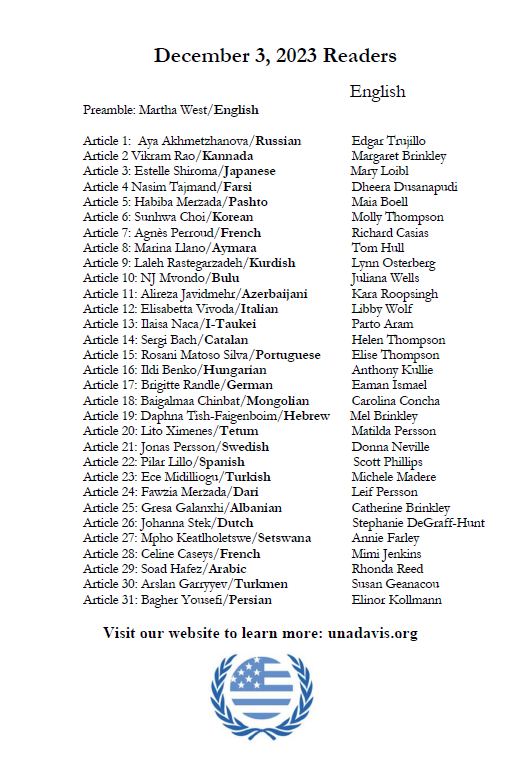Impressions of a gathering to focus on the United Nations‘ Universal Declaration of Human Rights
It was a wintry sunlit afternoon as participants and audience gathered at the International House in Davis in observance of the 75th anniversary of the adoption by the United Nations of the Universal Declaration of Human Rights.
I was there as one of the sixty-four speaking participants and would be reading Article 3 in English after the person seated in front of me had read the article in Japanese. We were seated in concentric circles with native speakers reading in many languages sitting in the inner circle, followed by the translation in English by community members seated in the outer circle. As I looked at the program, I was struck by the diverse languages represented - including Albanian, Mongolian, Pashto, Hungarian, Arabic, Hebrew, Swedish, and a few languages that were totally unfamiliar to me such as for example Setswana, I-Taukei, Bulu and Tetum. (The latter four are spoken in Botswana, Fiji, Cameroon and Timor-Leste.)
But beyond the program notes, there was the presence of young and old, people from so many cultures. I turned to speak to the young woman on my right and we talked about what had drawn us to the program. She spoke of her participation in the Human Rights program at UC Davis. And for both of us, and I imagine for many, we had come to affirm the value of the aspirational Declaration of Human Rights, and its importance in our lives, especially as a beacon for a better, more equitable world. As the articles were read, I felt the attentiveness, conviction and spirit of unity reflected in the voices and faces around me. It was a powerful experience.
After the reading, there was time for us to share our thoughts on the articles and the gathering. People spoke of how certain rights especially resonated with them. One person mentioned Article 13, the right to freedom of movement and residence within the borders of a state, as well as the right to leave any country and to return to his country, pointing to the situation in Gaza where that right is disregarded. Another person who had worked on water issues in Venezuela spoke of the unofficially added Article 31, citing the right to clean water and sanitation, and how both rural and urban communities world-wide still lack access to water. People also cited Article 26, the right to education; Article 23 that includes the right to equal pay for equal work and to form unions; Article 15, the right to a nationality, especially as there are millions of stateless people throughout the world; and Article 29, in which an individual’s duties to a community and respect for the rights of others is emphasized. One person mentioned talking to his son about the Declaration of Human Rights, and his son promptly replying, “That means I have my rights, too!” Laughter followed and it was noted that the UDHR website has an illustrated guide to the rights and further information and activities for children and adults.
Throughout the discussion, individuals highlighted how meaningful it was to learn about the Universal Declaration of Human Rights, particularly by reading the rights aloud, together in community, with the far-reaching echoes of so many languages.
Afterwards, there was the opportunity for further informal conversations at the reception. I enjoyed talking with women from Egypt, Mauritius and Peru, and also with an American woman who had three generations of her family participating in the reading! I could feel the great joy that permeated the room as people chatted, meeting other participants and sharing in the goodwill, renewed energy and hope kindled by gathering that afternoon in observance of an enduring vision and statement.
-Photography by Banafshe Sadeghi.
































